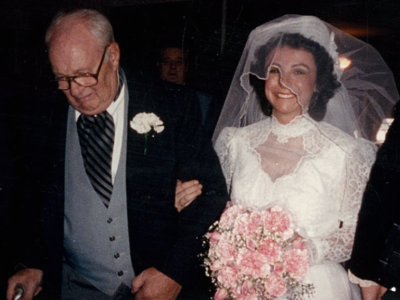This post describes, in part, the effects of a degenerative neurological condition called Huntington’s Disease. Any negative behavior on the part of my wife should be attributed to that condition. Any negative behavior on the part of myself should be attributed to my need for God’s ongoing grace.
If you would like to read our story from the beginning, you can start here: How We Got Here…
More changes this week. Janet is only awake four or five hours a day. It has also become very difficult for her to walk because she can’t really support her own (steadily decreasing) weight. I may have to stop taking her to the bathroom. No walker, no wheelchair, just the bed.
At one time, her world was the world. She traveled to Europe, toured the US, and we honeymooned in Tahiti. Then due to this disease, her world shrank first to a single town, then to an apartment, then a room and now to an 80″ x 34″ hospital bed.
Once a teacher capable of explaining the intricacies of mathematics with precise, clearly formulated explanations, her words and thoughts are now both garbled. She is sundowning badly and spends much of her awake time confused and hallucinating. Consequently, I find myself reassuring her more and more by saying, “Don’t worry Janet, I’ve taken care of everything…” Which makes me feel like a fraud because it doesn’t feel like I have taken care of anything.
A brochure that we got from hospice presented such a comforting, peaceful view of an “end of life” process in which Janet would just quietly and effortlessly drift off into eternity. I find myself wondering where one signs up for that program. Despite everything that I’ve seen and written, I still catch myself thinking, it can’t get worse than this – and then it does…
I was talking to the hospice nurse this week, and they have a respite program where they will pick Janet up in an ambulance, check her into an in-patient hospice facility for five days, and then bring her home at the end of the stay. Hopefully, this time will give Frannie and me a chance to get some badly-needed rest and recharge a bit before the last big push. When I told Janet about it, the first thing she said was:
“What did I do wrong?”
She thought that this was some kind of punishment or “time out.” Frannie and I both reassured her that it was just a time of rest for all three of us – her included.
“Just think,” I told her, “five whole days of getting taken care of by people who really know what they are doing – and not a couple of amateurs like us.”
This end time is also a season for learning new skills. Most recently I learned how to cry silently so as to not disturb Janet.
❦ ❦ ❦ ❦ ❦ ❦
While the phrase “Music Therapy” may, at first hearing sound, very New Age, nothing could be further from the truth. The concept was expressed eloquently in the opening lines of the tragic play The Mourning Bride written in 1697 by the British poet William Congreve:
To soften Rocks, or bend a knotted Oak.
I’ve read, that things inanimate have mov’d,
And, as with living Souls, have been inform’d,
By Magick Numbers and persuasive Sound.
What then am I? Am I more senseless grown
Than Trees, or Flint? O force of constant Woe!
‘Tis not in Harmony to calm my Griefs.
Anselmo sleeps, and is at Peace; last Night
The silent Tomb receiv’d the good Old King;
He and his Sorrows now are safely lodg’d
Within its cold, but hospitable Bosom.
Why am not I at Peace?
Although this verse documents a failed attempt at “soothing,” the concept predated the poem considerably. For example, Congreve’s line was probably a reference to a poem from the Roman poet Lucan, and Old Testament references to similar ideas (e.g. 1 Sam 16:15-16) show that the idea of music as a therapeutic agent was recognized far back into antiquity.
My first exposure to the idea came through a 1940’s cartoon in which Bugs Bunny quoted the line in his mixed Brooklyn/Bronx accent as:
– which in the cartoon was a rather dopy lion. Also note the change of the last word. In the 1940s you couldn’t mention “breasts” in films – even metaphorical ones. Whether it’s Bugs Bunny’s fault or not, this is still the most common misquotation of the line.
However, the modern practice of music therapy is based on far more than folklore and literary tradition. In recent years, medical researchers have scientifically documented the effects that music can have on people’s mental and emotional states by using brain scans to track the neural signals that tell the pituitary gland to release endorphins, the so-called “feel good” hormones.
Studies have also documented music’s ability to relieve stress, decrease symptoms of depression, reduce negative thoughts, and generally improve the listener’s state of mind. One interesting discovery that is of particular significance to caregivers is that there is no single kind of music that is universally therapeutic. Depending upon the person, and their mood at the moment, nearly any genre of music can be of benefit.
Music can also aid people in self-expression, or bring to mind past experiences. But remember, not all feelings that a person can express are positive, and not all past experiences are pleasant. For example, one person I spoke with for this article shared how she was singing the John Denver song Sunshine On My Shoulders in a group setting and one of the clients started crying uncontrollably. Interestingly, this client had previously been completely shut down emotionally and unable to participate – so while whatever memory the song brought up may not have been pleasant, perhaps those emotions were what was needed to start him on the path to healing.
Note that MT can be applicable even for people who are either totally or partially deaf, in that they can still feel the vibrations or other physical sensations associated with the music (called haptics). In fact there are several websites dedicated to the use of music therapy with people having hearing deficits.
Formally, Music Therapy (MT) comes in two forms:
Active MT – This form involves the actions of a therapist playing music for and with the patient, encouraging them to play or sing along. This sort of work often, though not always, occurs in a group environment – such as a group in a nursing home where the clients are in various stages of dementia. It can be really helpful to sing songs that the people remember from earlier in life because memories of music are apparently stored in a different part of the brain than normal everyday memories and will therefore last a lot longer. Singing old songs by themselves, or in combination with the playing of instruments or hand clapping, can get a person moving and interacting with other people, which in turn helps to improve mood and health.
Note that in many jurisdictions, music therapists have certification requirements similar to the requirements for other forms of therapy, but that doesn’t mean you can’t work with your loved one on your own.
For example, a spouse knows the songs that were meaningful to their loved one and can use that knowledge to help keep them present and involved. Certainly, the same thing would be true for a parent dealing with a child suffering from a degenerative condition. Remembering children’s songs can give comfort and support by reminding them of happier times before they got sick.
Passive MT – In this form of therapy, the patient listens to music without any sort of required participation. Again, a caregiver’s knowledge of their loved one can serve as a guide in selecting the appropriate music. For example, just because a magazine or website may say that Mozart is “soothing” not everyone will find it to be so. For example, a given person may prefer Charlie Pride, The Oakridge Boys, The Beatles, Aaron Nevill or even The Brighouse and Rastrick Band – and that’s OK. It is all about what is soothing to them.
And don’t forget about religious music. Even if the person doesn’t normally listen to “church music” every day, hearing a favorite hymn or music from their church’s liturgy can be a comforting reminder of God’s love and care. Some of my most wonderful memories from growing up were from family trips, where my mother would sing to my father to help him stay awake on long drives. Hearing those hymns now never fails to bring a tear to my eye, but they also make me feel warm and loved.
For more information on any of this you can refer to the American Music Therapy Association. Their website provides links for obtaining more information, as well as a function for locating a licensed music therapist here in the US. The main thing to remember is that as a caregiver you have insights that a stranger – no matter how professional they may be – does not have.
And finally, don’t forget that music therapy works for you too.
In Christ, Amen ☩
❦ ❦ ❦ ❦ ❦ ❦
A prayer for when you are feeling savage…
“Blessed are You, Lord God, King of the Universe. It is right that I should at all times and in all circumstances bless You for who You are. But today I want to bless You especially for a particular aspect of who my loved ones and I are. You have created us to be able to enjoy the music of others and the ability to create music of our own. Thank you for putting in our hearts the desire to make a ‘joyful noise’ in Your presence. Amen.”


